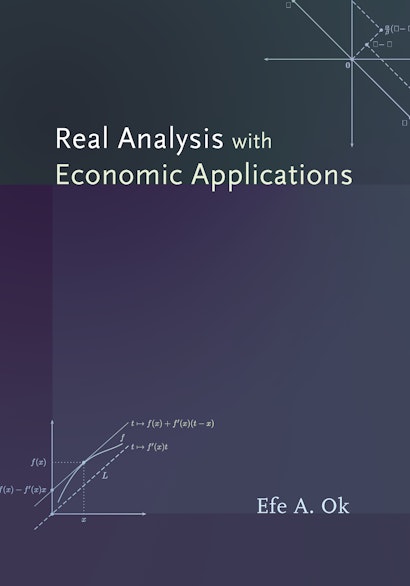There are many mathematics textbooks on real analysis, but they focus on topics not readily helpful for studying economic theory or they are inaccessible to most graduate students of economics. Real Analysis with Economic Applications aims to fill this gap by providing an ideal textbook and reference on real analysis tailored specifically to the concerns of such students.
The emphasis throughout is on topics directly relevant to economic theory. In addition to addressing the usual topics of real analysis, this book discusses the elements of order theory, convex analysis, optimization, correspondences, linear and nonlinear functional analysis, fixed-point theory, dynamic programming, and calculus of variations. Efe Ok complements the mathematical development with applications that provide concise introductions to various topics from economic theory, including individual decision theory and games, welfare economics, information theory, general equilibrium and finance, and intertemporal economics. Moreover, apart from direct applications to economic theory, his book includes numerous fixed point theorems and applications to functional equations and optimization theory.
The book is rigorous, but accessible to those who are relatively new to the ways of real analysis. The formal exposition is accompanied by discussions that describe the basic ideas in relatively heuristic terms, and by more than 1,000 exercises of varying difficulty.
This book will be an indispensable resource in courses on mathematics for economists and as a reference for graduate students working on economic theory.
Efe A. Ok is Associate Professor of Economics at New York University.
"The book is intended as a textbook on real analysis for graduate students in economics. It is largely graduate level mathematics, and the students should have a solid undergraduate real analysis background. . . . The author's writing style is . . . in general quite attractive. The book should be quite successful for its intended purpose."—Gerald A. Heuer, Zentralblatt MATH
"Important and commendable, this indispensable resource should be highly prized by all concerned with courses on mathematics for economists and by graduate students working on economic theory. Rarely do books meet such high aspirations and carry out their aims, yet this one certainly does. Well written in an engaging style and impressively researched in the requirements of graduate students of economics and finance, Real Analysis with Economic Applications is sure to become the definitive work for its intended audience. Real Analysis with Economic Applications with its large number of economics applications and variety of exercises represents the single most important mathematical source for students of economics applications and it will be the book, for a long time to come, to which they will turn with confidence, as well as pleasure, in all questions of economic applications."—Current Engineering Practice
"Because of its comprehensive coverage of the basic topics of real analysis that are of primary interest to economists, this is a much-needed contribution to the current selection of mathematics textbooks for students of economics, and it will be a good addition to any economist's library. It includes a large number of economics applications that will motivate students to learn the math, and its number and variety of exercises—forty to fifty in each chapter—is a further asset."—Susan Elmes, Columbia University
"This book is poised to be a standard reference. Its author gets high marks for care of execution and obvious devotion to, and command of, the topics."—Wei Xiong, Princeton University
"This very well written book displays its author's engaging style, and offers interesting questions between topics that make them entertaining to read through."—Darrell Duffie, Stanford University, author of Dynamic Asset Pricing Theory
"The idea of doing such a math book directed toward graduate students of economics and finance is an excellent one. There are many students who are interested in this topic, and—until now—the existing math books have not directed their examples and exercises toward an economics approach."—Salih Neftci, City University of New York

